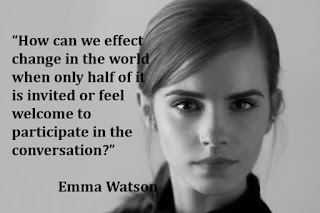Newsflash 1
Natalie Gwynn
Professor Simonson
Women’s Studies
10/10/17
What comes to mind when you hear the phrase, “Women in the workforce?” In recent discussions of this topic, a great deal of controversy has presented itself. It has brought out disputes between genders, social classes, political groups, government officials, companies, and even countries. But why? Although much of our society is attempting to progress towards total gender equality in all aspects of life, there is a hold up in the progression of this within several career fields. Certain areas of the economic world are still hung up on preserving the patriarchy that dominates this area, and halting the advancements of women to higher level positions within companies. Gender inequality in the business industry is preventing the existence of diversity within the workforce.
Patriarchy and oppression walk hand in hand with the challenges that women face in their introduction the the labor force. In a recent New York Times article, Kerry Hannon brought light to several of the hardships thrown at women in their attempts to establish themselves independently in this community. She introduced the readers to Chupi Sweetman-Durney, a woman who decided to make a name for herself as an entrepreneur, as many other women have also done out of frustration from working amidst unfair treatment and opportunistic disadvantage. In Sweetman-Durney’s transition, she experienced many aspects of unfair treatment that are prevalent to women today. She recalled it being extremely difficult to be taken seriously by business officials, and nearly impossible to overpower the discrimination against a working woman that was already so deeply ingrained within the minds of those around her (Hannon). Although unfortunate, it is true that our economic systems are ruled by patriarchy. A male dominated workforce is seen as the norm, and any exceptions to this are subject to ridicule. Decades have past, yet women are still facing similar types of oppression as they were when Elizabeth Cady Stanton and Susan B. Anthony drafted the Declaration of Sentiments. I believe that this oppression is rooted in the widespread acceptance of the Motherhood Mystique. It is an expectation of our society that it is the ultimate goal of women to become mothers and devote their lives to this role, an idea derived from our culture and history. But this ideology no longer makes sense in our civilization. If a woman is a stay at home mom then she has no relevance in society, and if she works too then she is a bad mother because she cannot fulfill her duties of adequately caring for her child, but if she chooses work over starting a family then is she even a woman at all? Each option is criticized, so which one is right? Is pregnancy a burden or a blessing? I simply do not know. We are taught to categorize women as mothers and men as workers, which leads to the oppression of any woman who tries to break this mold because she is not doing what she is supposed to be doing. She is vulnerable to judgement, cruelty, believed incapability and expectations of failure. Battling the patriarchy and unjust treatment that coexist with the workforce seems impossible, yet still some women are brave enough to try. In order to have any sort of success as a worker, women have to live their lives in total control of their destiny, staying ahead of the competition, overcoming discrimination, persisting through oppression, and putting in far more effort than any man has ever needed to. With a battle this difficult, the emergence of diversity within the workforce is difficult.
Women who strive to be a member of a company face several challenges alone, however none to the same extent as those who work to be among the highest power. The more power that a woman has, the more resistance she will be susceptible to. Because of the hegemony, in which we have accepted that men hold power and are in charge, that we work and live within, women can not be seen as ideal workers. In another New York Times article, Susan Chira discussed the capability of women to fulfill the role as the C.E.O of a company. She stated how “loneliness, competition, and deeply rooted barriers” serve as the largest obstacles, and that It is a preconceived notion that a working woman, although dependable, are less visionary and uncomfortable with self promotion (Chira). These biases push women to lack confidence in their abilities and often stray them from even attempting to succeed in this aspect of life. For a woman to fight her way to the top branches of a company, which is a strictly male dominated environment, she must do her best to resemble the characteristics of this “ideal worker,” despite the limitations and setbacks. She must be assertive, ambitious, self-reliant, authoritarian, and aggressive. Basically, she must comply to the “be a man” ideology. Any who can not comply to these are viewed as weak, and preyed upon by the men around them who feel entitled to the control. But a double standard exists among this because even if a woman does consist of all of these properties, she will still receive criticism. A woman who acts like a man is judged for not being a woman. She is supposed to have have female characteristics because she is a female, but how can she do both? I think that this double standard can be applied to Adrienne Rich’s speech, “Claiming an Education.” Rich motivates women to act rather than be acted upon, and claim their education rather than receive it. But is this too ambitious for women to do? Is claiming your education a male action that will lead to judgement of women who attempt to follow? There is no clarity of which measures will be socially accepted for women to take in pursuing a prestigious careers. It makes me wonder if perhaps this comes from male fear of assertive women, an outlash of jealousy, or simply just male arrogance. The extension of these hegemonic principles into every area of life are overwhelmingly shocking to me, however it makes complete sense as to why this gender inequality has discouraged a large majority of female involvement in the business world.
The recognition of gender inequality within the workforce is a problem within itself. Despite the conclusive evidence that proves that this problem does in fact exist, there are still some, predominantly men, who refuse to admit it. Vanessa Fuhrmans discusses this issue in her article in the Wall Street Journal, entitled, “The Battle of the Sexes.” Oppression of women taking on roles within the workforce is so common that it has become a social norm. It has pushed women to become less likely to feel as though they have equal opportunity to grow (Fuhrmans). There is a Cult of Domesticity/Womanhood that regulates our expectations of working roles, stating that women, based on their assumed characteristics, are better suited in the private sphere, and men, based on theirs, are better suited in the public sphere. We justify this with stereotypical characteristics that are imbedded in our minds, such as that women are sympathetic and accepting, and men are powerful and strong in their beliefs, and use them to make this ideology make sense. But are these even true, and if so why do we allow them to distinguish our social standing? We cannot overcome this issue without a collective effort, this beginning with honest evaluations. Many companies are claiming efforts to fix it, but if this is really true then we would see results. We cannot move forward towards fixing this gender inequality if the women are the only ones recognizing the issue. I believe that if we could move past these prerequisites then diversity in the workforce would no longer be limited.
Gender inequality is an eminent issue within our world today. It’s impacts are widespread within our nation, however the impact of it within the workforce is most prevalent. We live in a society that functions around hegemony, patriarchy and oppression. It creates difficulty and struggle for those who fall victim to it, and we must overcome. Without the recognition of this as a serious problem, we will potentially never see diversity within the workforce.
Work Cited
Rich, Adrienne. “Claiming an Education.” Convocations at Douglass College 1977. Convocation at Douglass College, 1977, 3 Sept. 2017.



Comments
Post a Comment